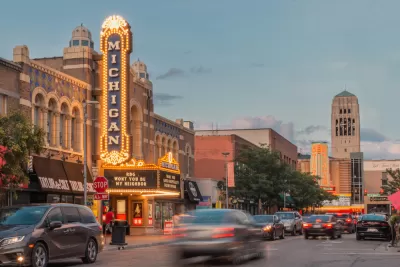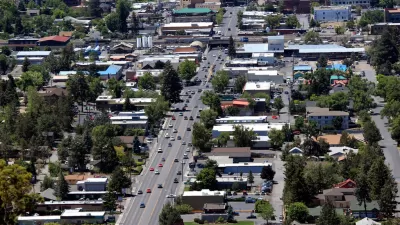Ann Arbor, Michigan approved changes to the city’s Unified Development Code (UDC) earlier this week that eliminate off-street parking requirements for a variety of development types throughout the city.

The Ann Arbor City Council voted earlier this week to eliminate parking requirements throughout the city—another incremental step for the parking reform movement built on the research and rhetoric of Donald Shoup, author of the High Cost of Free Parking.
Josh Hakala reported the news of the zoning changes for WEMU, after the news of the vote was left to circulate on Twitter for an entire day. Hakala’s brief account of the news includes a soundbite from Ann Arbor Councilmember Erica Briggs.
“According to Briggs, by eliminating unnecessary parking, developments are able to save money, which makes housing and businesses more affordable. She says by reducing the amount of asphalt and using less space for parking, the city can be more walkable, which is good for the environment,” writes Hakala.
A city staff report prepared in advance of the vote lists the kinds of land uses that would no longer require minimum numbers of parking spaces to include residential occupancies, adult and child care centers, outdoor recreation, transit corridor developments, and nonprofit corporations. Other changes, like changes to the Required Parking-Calculating Required Parking section of the UDC were also approved by the city council.
For more analysis of the vote, see a blog post by Nat. M. Zorach for the Handbuilt City. According to Zorach’s assessment, the zoning changes implemented by Ann Arbor “may bode well for a region that has struggled to adopt more progressive transportation and land use policy measures.”
Zorach’s coverage, linked in the source article below, includes background on parking requirements and the intended goals of reforms like those approved in Ann Arbor.
FULL STORY: Ann Arbor Axes Parking Minimums. In Michigan, That’s Huge.

Alabama: Trump Terminates Settlements for Black Communities Harmed By Raw Sewage
Trump deemed the landmark civil rights agreement “illegal DEI and environmental justice policy.”

Planetizen Federal Action Tracker
A weekly monitor of how Trump’s orders and actions are impacting planners and planning in America.

The 120 Year Old Tiny Home Villages That Sheltered San Francisco’s Earthquake Refugees
More than a century ago, San Francisco mobilized to house thousands of residents displaced by the 1906 earthquake. Could their strategy offer a model for the present?

In Both Crashes and Crime, Public Transportation is Far Safer than Driving
Contrary to popular assumptions, public transportation has far lower crash and crime rates than automobile travel. For safer communities, improve and encourage transit travel.

Report: Zoning Reforms Should Complement Nashville’s Ambitious Transit Plan
Without reform, restrictive zoning codes will limit the impact of the city’s planned transit expansion and could exclude some of the residents who depend on transit the most.

Judge Orders Release of Frozen IRA, IIJA Funding
The decision is a victory for environmental groups who charged that freezing funds for critical infrastructure and disaster response programs caused “real and irreparable harm” to communities.
Urban Design for Planners 1: Software Tools
This six-course series explores essential urban design concepts using open source software and equips planners with the tools they need to participate fully in the urban design process.
Planning for Universal Design
Learn the tools for implementing Universal Design in planning regulations.
Clanton & Associates, Inc.
Jessamine County Fiscal Court
Institute for Housing and Urban Development Studies (IHS)
City of Grandview
Harvard GSD Executive Education
Toledo-Lucas County Plan Commissions
Salt Lake City
NYU Wagner Graduate School of Public Service





























